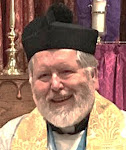The bishop at whose hands I was confirmed was Marcus Loane (1911-2009). He was to become Archbishop of Sydney. (Fifty years later, I still vividly remember his sermon from my Confirmation day.) Sir Marcus was in every way a “Reformation man”, who nonetheless as Primate of the Australian Church showed great respect for those Anglo-Catholics he felt were Christ-centred and who preached the Gospel. He was a particular friend of the Anglo-Catholic Archbishop Philip Strong - a friendship that went back to World War II, when Loane served as an army chaplain in Papua New Guinea. During his 97 years Archbishop Loane wrote many books and articles, including biographies of evangelical leaders. In They Were Pilgrims, Loane tells the story of Robert Murray M’Cheyne (1813-1843) a minister in the Church of Scotland who, though he died at the age of 30, had made a big impact on the lives of many. This quote from the book reveals as much about Sir Marcus as it does about McCheyne:
“The secret of his success . . . was his faithfulness to the Word of God with tenderness for the souls of men. He went about his work with an air of reverence which made men feel that the majesty of God was in his heart. There were few who could exhort the guilty in more searching or tremendous terms; there were few who could address the troubled in more gentle or persuasive terms. Andrew Bonar once told him how he had chosen for a text the words with regard to the doom of those who forget God and are sent to hell (Psa. 9:17). M’Cheyne at once asked him:’Were you able to preach it with tenderness?’ He knew that there is an enormous difference between a voice that scolds and a heart that yearns . . . It is not by threats and thunder, but by love and pathos that hearts are made to melt; it is not by words that scorch and condemn, but by a heart that bleeds to bless that souls are won. M’Cheyne himself preached on eternal destiny as one whose heart was wrung with a sense of anguish. He did not spare his hearers a word of truth; still less did he spare his own feelings a stab of pain . . . J. H. Jowett once said that his seventies were terrific because they were so tender . . . Both the motive and the power in all such preaching may be discerned in his sermon as a broken heart and contrite spirit. ‘It is not’, he said, ‘a look into your own heart, or the heart of hell, but into the heart of Christ, that breaks the heart. Oh, pray for this broken heart!’”


















0 comments:
Post a Comment